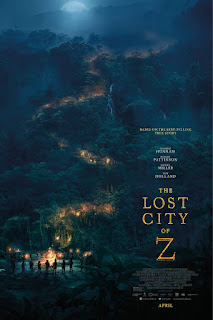The Lost City of Z (2017)
I wanted to see The Lost City of Z for two reasons: I love stories about explorers going into uncharted lands, and I read the book. The film, written and directed by James Gray from David Grann's book, is a solid effort, but it's like a dish that smells good but is missing an ingredient.
There had long been a legend among European explorers of South America about El Dorado, the city of gold. It was pretty much a fairy tale by the twentieth century, but a British officer, Percy Fawcett, hired by the Royal Geographical Society to settle a border dispute between Bolivia and Brazil, came to believe that somewhere deep in the jungle there was a lost civilization, which he called Z (Zed in the British). Over the course of three expeditions, he pushed farther into the Amazon, but never found it.
Gray is dutiful to the facts of the book, though Fawcett, played by Charlie Hunnam, really isn't a character as much as a means to an end. Grann's book spelled out more of his eccentricities, but here he's just a guy on a mission. The only really interesting character is James Murray (Angus Macfadyen), a polar explorer who believes in Fawcett and joins him on his second mission, but does not fare well.
On Fawcett's third expedition, over a decade after his previous one, his son (Tom Holland) joins him on the search for the lost civilization, but they disappeared and were never found.
All of this is what might be called a pretty good yarn, with indigenous people throwing spears and dangerous rivers and snakes and infected wounds (the book is full of descriptions of things that can kill you or make your life miserable) but there is a sense of incompleteneness, probably because Fawcett did not succeed and Gray can only guess at what happened to him (it's one of the reasons I had a problem with Zodiac--a movie that doesn't catch the killer is missing an ending). He was ahead of his time in believing that the so-called savages of Amazonia were not backward and capable of a civilization, and believe that women (including his wife, ably played by Sienna Miller) were intellectual equals.
The movie is more interesting than entertaining, and probably would have been served better as a Ken Burns-style documentary. In the book, Grann writes participatory journalism, as he covers some of the ground that Fawcett did, but this is completely cut from the film.
So, a near-miss for James Gray, who finally made a movie set outside New York. Maybe he was a little out of his depth.
There had long been a legend among European explorers of South America about El Dorado, the city of gold. It was pretty much a fairy tale by the twentieth century, but a British officer, Percy Fawcett, hired by the Royal Geographical Society to settle a border dispute between Bolivia and Brazil, came to believe that somewhere deep in the jungle there was a lost civilization, which he called Z (Zed in the British). Over the course of three expeditions, he pushed farther into the Amazon, but never found it.
Gray is dutiful to the facts of the book, though Fawcett, played by Charlie Hunnam, really isn't a character as much as a means to an end. Grann's book spelled out more of his eccentricities, but here he's just a guy on a mission. The only really interesting character is James Murray (Angus Macfadyen), a polar explorer who believes in Fawcett and joins him on his second mission, but does not fare well.
On Fawcett's third expedition, over a decade after his previous one, his son (Tom Holland) joins him on the search for the lost civilization, but they disappeared and were never found.
All of this is what might be called a pretty good yarn, with indigenous people throwing spears and dangerous rivers and snakes and infected wounds (the book is full of descriptions of things that can kill you or make your life miserable) but there is a sense of incompleteneness, probably because Fawcett did not succeed and Gray can only guess at what happened to him (it's one of the reasons I had a problem with Zodiac--a movie that doesn't catch the killer is missing an ending). He was ahead of his time in believing that the so-called savages of Amazonia were not backward and capable of a civilization, and believe that women (including his wife, ably played by Sienna Miller) were intellectual equals.
The movie is more interesting than entertaining, and probably would have been served better as a Ken Burns-style documentary. In the book, Grann writes participatory journalism, as he covers some of the ground that Fawcett did, but this is completely cut from the film.
So, a near-miss for James Gray, who finally made a movie set outside New York. Maybe he was a little out of his depth.



Comments
Post a Comment